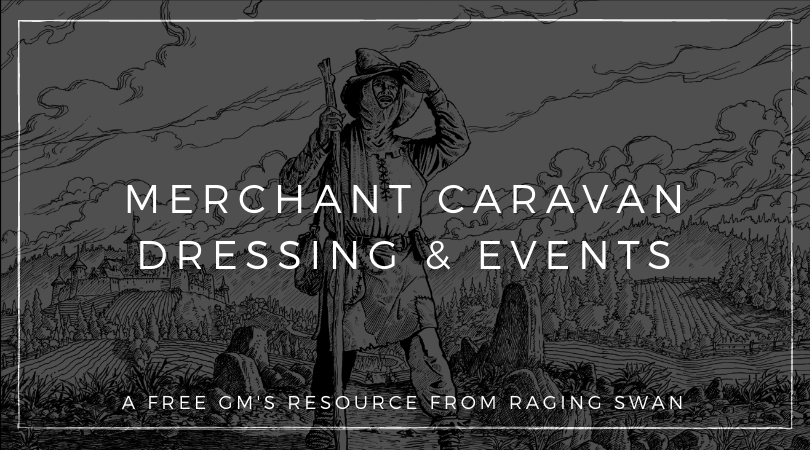Merchant Caravan Dressing & Events
A merchant caravan is a unique thing. Beside its guards, servants and merchants it has distinctive characteristics, features and events in the same way as any other locale.
Caravan Dressing
Each of the caravan’s wagons has the sigil of its owner painted on the side. The quality of the painting is a good reflection of the owner’s status and success.
Each of the carters is armed—a loaded crossbow and club lie within easy reach; the carters are expect to contribute to the caravan’s defence, when required. Most have no intention of risking their lives if trouble should strike, and will be less than useful in a fight.
Several hangers-on have attached themselves to the caravan—either for safety or to earn a few coin. Such folk include a peddler, a handyman and two wandering mercenaries. All are available for hire.
Travel stained pennants and bunting hang forlornly from the sides of the caravan’s wagons. Designed to be gaudy and to attract attention, the flags fail miserably at their job. (The merchant will have them cleaned when the caravan reaches its destination).
A bard travels with the caravan. Sitting atop one of the wagons, he (incessantly) plays his lute. Some enjoy his music while others wish he would take a break. All that aside, however, the music carries for some distance—and could attract predators.
A powerful warhorse pulls one of the wagons. The horse is fully trained for war, and was given to the merchant in lieu of normal payment of a debt. The owner is happy to sell the horse—for a tidy profit—once the caravan has reached its destination.
A heavily armoured coach rumbles along as part of the caravan. The coach could be a rich merchant’s personal conveyance or might be on the way to be delivered to a wealthy local. Alternatively, it could have been hired by a wealthy traveller intent on a safe journey.
A perceptive character notices the tracks left by one of the wagons are much deeper than the others. This suggests its load is heavier—and perhaps more valuable —than normal.
The caravan—along with the normal wagons and such—comprises a half-dozen sheep being driven to market. The sheep are noisy and slow, much to annoyance of the caravan's folk. The sheep are the source of many arguments between the merchants—and could attract predators to the train.
The caravan is well guarded. Twenty vigilant men-at-arms protect the train, suggesting something valuable is hidden somewhere among the wagons. The guards are so numerous that any normal group of bandits let the caravan pass unmolested.
Minor Events
The wheel on one of the wagons suddenly snaps, and the wagon lurches to one side. If the wagon was moving, the damage was caused by a deep pothole in the track. If the wagon was stationary, the cause is less clear. In any event, the wheel must be repaired before the wagon can move again.
Birds suddenly erupt noisily from a nearby tree, as if startled by an approaching predator. They flock together before flying off swiftly to the east.
One of the wagons abruptly veers off the trail, and gets tangled in a bush. Investigation reveals the carter was asleep and/or had been drinking heavily. The wagon must be extricated before the caravan can continue on its way.
A dog darts between the wagons, barking furiously. It nips at the heels of one of the horses which rears up, neighing loudly. The carter struggles to control the horse, as the dog continues its attack.
Light rain falls on the caravan. Those that can take cover in its wagons and carriages. Those that cannot pull their cloaks up around their ears—resigned to a long, wet day.
A trio of beggars trail the caravan; when the caravan stops, they catch up and beg for food, shelter and coin. One of the three is a thief who waits for night to pilfer the merchant’s choicest, most portable goods before fleeing back to town.
The caravan guards are jumpy; rumours of bandits, brigands and other marauders in the locality have rendered them suspicious toward strangers—particularly heavily armed strangers.
A band of hunters—carrying the pelts of several bears, wolves or other animals appropriate for the locale—approach the caravan to sell their wares. Vigorous haggling ensues. The hunters know the surrounding area well and may be able to provide the characters intelligence on nearby sites of interest.
One of the caravan’s horses throws a shoe. This inevitably slows down or delays the caravan.
One of the (bored) caravan’s guards or servants (see “Notable Guards & Servants’) strikes up a conversation with the characters. They want to hear stories of the characters’ adventures, and in return share a local legend or two (which could lead to a side trek).
This is an extract from 20 Things #68: Merchant Caravan, a System Neutral resource by Creighton Broadhurst.
Words Creighton Broadhurst Art William McAusland
